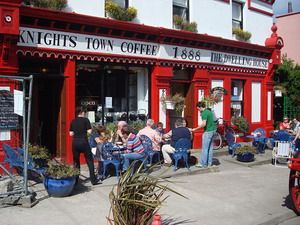 Ninety percent of adults in North America consume caffeine daily. It is the most widely used psychoactive substance in the world. Caffeine is a central nervous system stimulant found in over 60 different South American and Asian plants, but we are most familiar with just three sources: coffee, tea, and to a small extent, chocolate.
Ninety percent of adults in North America consume caffeine daily. It is the most widely used psychoactive substance in the world. Caffeine is a central nervous system stimulant found in over 60 different South American and Asian plants, but we are most familiar with just three sources: coffee, tea, and to a small extent, chocolate.Caffeine seems to get both bad press and good press largely because, like most physiologic substances, it has a “safe” dose and as you increase the amount you use, it becomes unsafe. This is true of water, food, salt, sunlight, most everything. And like many such things, because it makes us feel good we tend to over use it and that produces damage.
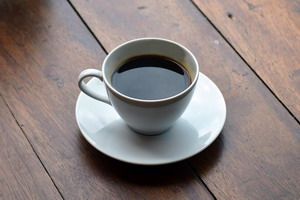 The most popular beverage containing caffeine is coffee, which contains 80 to 135mg of caffeine per cup. Tea is less concentrated at 25 to 75 mg per cup, while one bar of Hershey’s dark chocolate has about 30mg. Of course we also have our favorite energy drinks like Red Bull with 80mg per serving or classic Coca cola at 34mg per can.
The most popular beverage containing caffeine is coffee, which contains 80 to 135mg of caffeine per cup. Tea is less concentrated at 25 to 75 mg per cup, while one bar of Hershey’s dark chocolate has about 30mg. Of course we also have our favorite energy drinks like Red Bull with 80mg per serving or classic Coca cola at 34mg per can.So what is the “safe” dose for caffeine? For most humans about 500mg per day is the safe and tolerable amount that is associated with positive health outcomes, or about 3 to 5 eight ounce cups of coffee a day. The maximum tolerable dose without serious side effects is 1200mg per day. Beyond that and you start showing signs of caffeinism symptoms including nervousness, irritability, restlessness, insomnia, headaches, and palpitations. Ten grams of caffeine, which is about 5 teaspoons is deadly.
 Caffeine is actually made by plants as an insecticide to keep bugs from munching on them. It also inhibits the growth of weeds and young plants around the mother plant when the leaves containing the caffeine fall to the ground and the ground becomes full of caffeine. Honeybees seem to like the buzz they get from the caffeine.
Caffeine is actually made by plants as an insecticide to keep bugs from munching on them. It also inhibits the growth of weeds and young plants around the mother plant when the leaves containing the caffeine fall to the ground and the ground becomes full of caffeine. Honeybees seem to like the buzz they get from the caffeine.What does caffeine do inside us? Its primary mode of action seems to be to block the effects of a brain substance called adenosine, which makes us drowsy. With this blocked, our levels of dopamine and glutamate increase, which are stimulatory neurotransmitters. These make us feel more awake and happy. Too much glutamate makes our brain explode (yes brain cells literally explode), so too much caffeine is a bad thing.
 That being said, caffeine in the safe amounts have been associated with lower death rates from various cancers and from heart disease. Medically caffeine is actually administered for certain diseases like low blood pressure that makes you dizzy when you get up from lying down, and certain breathing conditions in premature infants. Caffeine increases our metabolic rate and improves our ability to think, focus, and improve coordination. The best dose to achieve these effects varies from one person to the next, so caffeine is a “trial and error” drug. It takes time to find out if it benefits you and how much you need to use for that benefit. Just keep your total daily dose below the 500mg per day and you should be good. If you consume more than then recommended maximum dose, it starts having negative effects on all the positive outcomes studies have reported.
That being said, caffeine in the safe amounts have been associated with lower death rates from various cancers and from heart disease. Medically caffeine is actually administered for certain diseases like low blood pressure that makes you dizzy when you get up from lying down, and certain breathing conditions in premature infants. Caffeine increases our metabolic rate and improves our ability to think, focus, and improve coordination. The best dose to achieve these effects varies from one person to the next, so caffeine is a “trial and error” drug. It takes time to find out if it benefits you and how much you need to use for that benefit. Just keep your total daily dose below the 500mg per day and you should be good. If you consume more than then recommended maximum dose, it starts having negative effects on all the positive outcomes studies have reported.A close cousin to caffeine is theobromine; the stimulant primarily found in chocolate. The word literally translated means “food of the Gods.” Theobromine is a heart stimulant, diuretic, and vasodilator. It acts on the brain in a similar fashion to caffeine, although the stimulatory effect rises more slowly and lasts longer, so it is a gentler lift than caffeine.
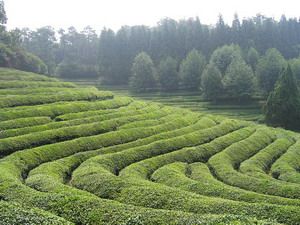 Tea, especially green tea, moderates the effect of the caffeine through the health properties of the polyphenols in the green tea. The caffeine in coffee can feel harsh to many folks, but the lift from green tea feels cleaner and clearer. The idea here is that the benefits of caffeine can be enhanced and moderated by what the caffeine is consumed with.
Tea, especially green tea, moderates the effect of the caffeine through the health properties of the polyphenols in the green tea. The caffeine in coffee can feel harsh to many folks, but the lift from green tea feels cleaner and clearer. The idea here is that the benefits of caffeine can be enhanced and moderated by what the caffeine is consumed with.Personally I have avoided coffee my entire life, both because I don’t like the bitterness in most coffee, plus I don’t like drinking hot beverages. But my recent experiments in making cold brew for Ellen prompted me to try some cold brew myself. I was pleasantly surprised and have since been enjoying some cold brew with Ellen in the morning.
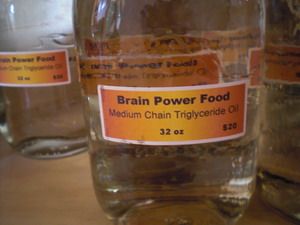 A while back I was also introduced to the idea of adding coconut oil – particularly the MCT portion of coconut oil to coffee – as an added source of brain support. MCT oil serves as a direct brain food. In fact I offer it in the office for that very purpose. I call it Brain Power Food. It is the stuff that looks like moonshine at the front desk. Someone gave the combination of MCT and coffee the name Bullet proof coffee as part of a promotional ad campaign.
A while back I was also introduced to the idea of adding coconut oil – particularly the MCT portion of coconut oil to coffee – as an added source of brain support. MCT oil serves as a direct brain food. In fact I offer it in the office for that very purpose. I call it Brain Power Food. It is the stuff that looks like moonshine at the front desk. Someone gave the combination of MCT and coffee the name Bullet proof coffee as part of a promotional ad campaign. Naturally I figured I could improve on the concept, so I did. I created a new product I am calling “Wakeup Call.” I designed it as an additive to coffee, but found I also liked it added just straight to hot water – once I let the water cool down a bit. I took the Brain Power Food MCT oil and combined it with green tea extract and raw cocao powder. This produces a nice syrup similar to Hershey’s chocolate syrup, but with the benefit of the MCT oil, the polyphenols in the cacao and green tea, the theobromine from the chocolate, and the extra caffeine from the green tea extract. Each teaspoon of Wakeup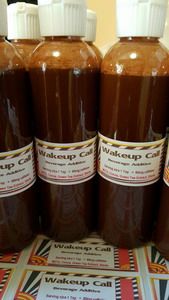 Call gives you an extra 60mg of caffeine, with the moderating qualities of the chocolate and green tea. To take the bitter edge off the raw cacao and green tea, I added a tiny bit of stevia. The touch of sweet takes the bitterness down quite a bit.
Call gives you an extra 60mg of caffeine, with the moderating qualities of the chocolate and green tea. To take the bitter edge off the raw cacao and green tea, I added a tiny bit of stevia. The touch of sweet takes the bitterness down quite a bit.
 Call gives you an extra 60mg of caffeine, with the moderating qualities of the chocolate and green tea. To take the bitter edge off the raw cacao and green tea, I added a tiny bit of stevia. The touch of sweet takes the bitterness down quite a bit.
Call gives you an extra 60mg of caffeine, with the moderating qualities of the chocolate and green tea. To take the bitter edge off the raw cacao and green tea, I added a tiny bit of stevia. The touch of sweet takes the bitterness down quite a bit. Since you only need a teaspoon at a time, a single 4 ounce bottle gives you 24 servings. So at $12 a bottle it is like getting 24 extra cups of coffee in terms of lift and improved performance. You are getting the health benefits of an equivalent number of cups of green tea and you are getting the brain boost from the MCT oil.
I am going to set some up for you to try in the office next week, so if you feel like it, swing on by for a free cup of cold brew coffee with a boost of Wakeup Call added to it. Let me know what you think!
